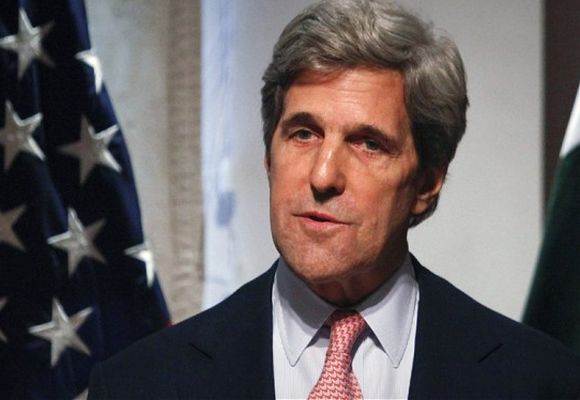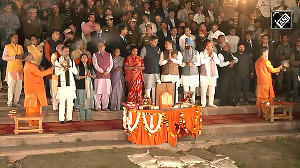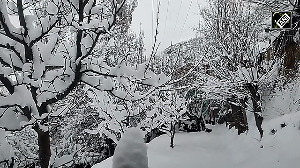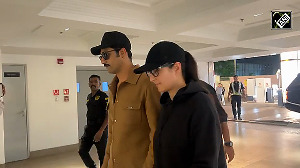 Calling India an indispensable partner for the 21st century, United States Secretary of State John Kerry said on Monday the dynamism and entrepreneurial spirit of this bilateral relationship is needed to solve some of world's greatest challenges.
Calling India an indispensable partner for the 21st century, United States Secretary of State John Kerry said on Monday the dynamism and entrepreneurial spirit of this bilateral relationship is needed to solve some of world's greatest challenges.
Laying out a roadmap for a long-term strategic partnership between the largest and oldest democratic countries, Kerry said that deepening America's ties with India is a strategic imperative.
Noting that the India-US ties is yet to "blossom" together, Kerry said, "This is a potentially transformative moment in our relationship with India."
Kerry was referring to the post-election scenario and the formation of the new government, which he said has received historic mandate from its people to deliver change.
"The US and India can and should be indispensable partners for the 21st century. The dynamism and entrepreneurial spirit of our relationship is needed to solve some of world's greatest challenges," he said.
He said the two countries can work together to tackle global challenges from climate change to clean energy and others.
Kerry, who heads to New Delhi on Tuesday to co-chair the fifth India-US strategic dialogue on July 31 with his Indian counterpart Sushma Swaraj, said, "This is a potentially transformative moment and we are determined to deliver on opportunities we can create together."
Kerry will be accompanied by the US Secretary of Commerce Penny Pritzker, as well as other members of the inter-agency, including Department of Energy, Department of Homeland Security and NASA. The trip will mark the first US cabinet-level visit to New Delhi since Prime Minister Narendra Modi took over office.
"The new Indian government plans 'Sabka Saath, Sabka Vikas' -- together we all development for all -- is a vision that we want to support," the Secretary of State said this in his address on 'The United States and India: A Shared Vision for 2020 and Beyond' at the Center for American Progress, a major US think-tank.
"We believe this to be a great vision," Kerry said as he praised the vision and developmental concept of Modi.
Kerry said it is time to adopt Modi's vision of development.
"Innovation and entrepreneurship is both in our DNA," he said, adding that the US and India can't afford to rest back on these advantages.
More American companies would come to India if the new Indian government goes ahead on its promise of liberalisation and economic reform, he said.
Modi, as the Gujarat Chief Minister has already provided a model of ambitions growth, he said, and sought to increase the bilateral trade between the two countries to $500 billion per annum.
Kerry in his speech supported India's vision of an integrated South and Central Asia and that with the South East Asia.
The Obama administration is ready to help India in this regard, Kerry said as he praised Modi's steps to establish peace and improve relationship with the neighbouring countries.
By inviting Pakistan Prime Minister Nawaz Sharif to his inauguration, Kerry said Modi has taken the "first step" to establish peace and friendship with its South Asian neighbour.
Supporting the move to increase India-Pak economic relationship, Kerry said improved trade is a win-win for both countries, both economies, and both peoples.
Reiterating support for India's place in the UN Security Council, Kerry in his speech said India is a global power.
The Secretary of State listed out the progress made between the two countries in various areas including economy, clean energy, and counter-terrorism.
The India-US collaboration on counter terrorism, in particular real-time information sharing, helps confront common threats and bring terrorists to justice, he said.
Describing climate change as a biggest challenge not only for the world, but also India, Kerry called for increased collaboration between the two countries on this issue.
"Of the 10 cities in the world with the worst air quality, six are in India," he said.
In his speech, Kerry also spoke about monsoon deficit and Uttarakhand floods.
Climate change is already a catalyst for instability, he said, adding that climate vitality is already taking a toll on Indian population.
"Forging the solutions are a huge economic opportunities for both India and the US," he said.
"The solution to climate change is energy policy...It's a huge market," he said, adding that today's energy market is $6 trillion market.
Kerry in his speech supported the call of "saffron revolution" by Modi and said that US is ready to do all it can with all its technology and resources in this regard.
"We are two confident nations connected by core values, optimistic nations…," he said, as he spoke on women’s issues.
"This can be a moment where our destinies do converge," he said, referring to the history speech by India's first Prime Minister Jawahar Lal Nehru.
Kerry said US President, Barack Obama would welcome the Indian Prime Minister at the White House in November.
Earlier Vikram Singh, vice president, CAP's National Security and International Policy, announced the launch of "India: 2020", a new initiative focused on elevating the foreign policy debates in South Asia by looking at short and long-term policy priorities and analysing ways to realise the full potential of the relationship.
"India 2020 is a new Center for American Progress initiative to better understand and explain the changing dynamics in India. We call it 2020 because we are focused on the direction India is moving; we are more focused on where India is going, than where it's been," said Neera Tanden, CAP president.











 © 2025
© 2025